MIGRANTS' STORIES - PART I
Photos & text: Eliza Kowalczyk
Families from Iraq
October 31, 2021, beautiful autumn sunrise. My husband and I are going to take pictures of nature. We are heading to the areas where we met moose, wet meadows right on the border of the strict reserve of the Białowieża National Park. Looking around for the dark silhouette of the animal, we notice movement among the trees. We quickly take this direction and follow the movement from a distance. We are surprised by the red color that appears. I jump out of the car and take a shortcut, knowing now that it's not an animal, but a group of people. They run away, thinking that the Border Guard or the Police will catch them soon. I go through the destroyed fence to the strict nature reserve. I'm sinking in the mud, I'm losing sight of them. In the distance, I see a man with a child in his arms in a red jumpsuit. I shout in English that I am a friend and I want to help. He stops and more figures "grow up" from the ground like trees.
It's a group of ten people, 5 of whom are children. They are dirty, wet and hungry. We sit on birch trunks and tufts of grass. My husband brings a backpack from the car, which has been in the car since the beginning of the crisis. For such a large group, however, we need more food, clothes, shoes, after all, there are children in the group also. I am asking for help from my friends, local activists, and even though it is 6 am and they are after a very active night, they collect typical data from us and prepare things to deliver them to the designated place. Typical, because you don't need to write: we need shoes in sizes such and such, you just write: 39.42x2, 41, 30 and that's enough. Before help arrives, we talk, find out who they are and what their history at the border is.
These are two Iraqi families and a single Iraqi man with refugee status in Yemen. Pusbacked 13 times. One of the children is not yet a year old. One family with two young children Zeidi Hanin with girls Zahra two years old and Ghasle one year old. How did they walk through the forest with these little children? They had to carry them in their arms all the way. Without a warm meal and a roof over their head. The second family is the marriage of Ali and Wedian with children Aras 10 months, Yakein 8 years and Hussain 9 years. None of them speak English. Only the lonely Ghamdan is our interpreter and thanks to him we can communicate with the whole group. Children quickly get used to us, after eating fruit mousses and chocolate bars, they come to life and start interacting with us and playing with each other. We make sure they're not too loud. Adults are in a different mood, after so many pushbacks they are tired, resigned and desperate.
It's hard to explain to them that we can't help them in any other way than to provide them with food, medical aid and clothes. We also explain that they are in a no-go zone and the army and police are everywhere. Ghamdan is crying, it's hard to see, we can be with him right now and pat him on the shoulder. Nothing more. Help arrives, we distribute shoes and clothes, a friend bandages feet. We give a supply of food, diapers, and milk for babies. Wedian, mother of the youngest child, Aras, gets dressed while he sleeps on a sleeping bag under a birch tree. He wakes up and starts crying, I take him in my arms and rock him. I wanted to take them all home, where my children slept in warm beds. At the request of Ghamdan and the other families, I take pictures. They ask me to show the world what the nightmare looks like on the Polish-Belarusian border. Nothing can describe the feelings we had then. We feel helplessness, despair and terror when we have to turn our backs on them and leave. We're leaving. The whole next year I had been trying to find them. Unsuccessfully. I wish and hope they are safe.
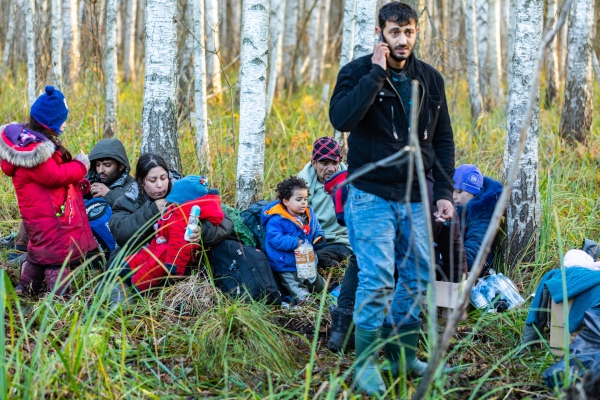
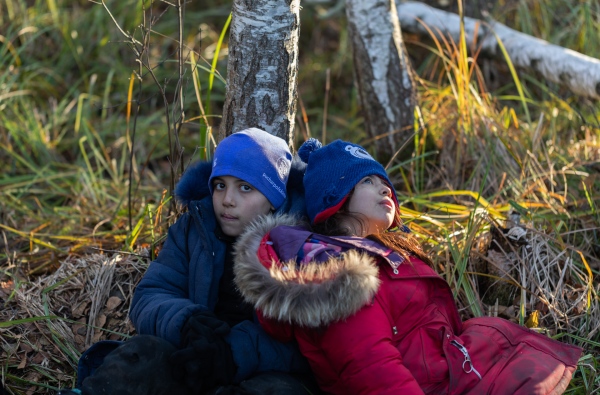
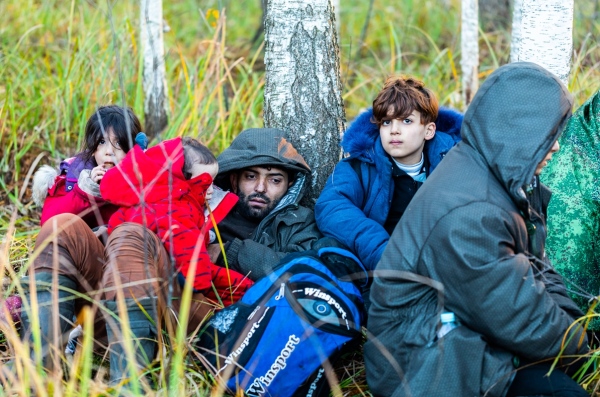
Yara, 9 years old,
(Palestine/ Lebanon)
April 28, 2022. After a winter break in border crossings, when the Belarusian services gathered refugees in a warehouse in Bruzgi (Belarus), it got crowded in the spring when they began to push them to the Polish side. What people we meet in the forest often tell us is the famous saying "you go there or you die here", I have heard it many times. So many people needed help that there was a shortage of humanitarian activists. For many months after the beginning of the crisis, aid was already well planned and organized. “People were needed” - on one of the local groups there was a request: who could go to the forest. I applied. I didn't wait long for the news that I had to go.
The thing with pins was that the coordinates could become outdated in a fraction of a second: people moved, disappeared, their phones went dead, GPS went crazy. I had the morning off and was free to help someone out if needed or go out for pictures. I got information that there is a group near me that needs to be brought food and drink. At the last moment, when I was ready to move, it turned out that they were in a completely different place and rather difficult to access for me. Someone took over the group and I was moving with the camera. Knowing that trips with the camera in recent months often end up with meetings with people in need of help. In my photographic equipment there was water, NRC foil, power bank, food and a mini first aid kit. I received a message that the pin was close. It was in a swampy but familiar terrain, with many pitfalls and fallen trunks. It was difficult, but in daylight I could overcome it quite quickly.
I knew there had been people fleeing across the border in the area, you could meet them everywhere. In the spring of 2022, they did not hide so much, believing in the good, human intentions of the inhabitants of the area. I knew that I was going to a father with a sick child. The mere thought of what condition I would find them in and whether I would be able to help them adequately aroused great fear in me. I had to move very carefully, so as not to reveal their whereabouts. I did not allow myself to think that I could be the reason for their expulsion to Belarus.
The GPS on my phone guided me through dense spruce trees. Right next to the location I was looking for, I came across a group of sleeping men. They were sleeping so profoundly that they didn't even notice me leaning over to check their condition. I had to leave them to reach a sick child. They were in such a strong sleepy lethargy that they did not move. I came back to them later. Meanwhile I kept walking to my destination.
Father and daughter camped under the spruces at the High Marsh. He was terrified at the sight of me, but kept his composure and anyway had no way of escaping because the baby lay motionless under the sleeping bag. The girl didn't even flinch. It immediately crossed my mind that she was dead. It's such fractions of a second when the whole world spins and you can't stop the rushing thoughts and feelings of fear. The man didn't speak English so I couldn't communicate with him. He showed meds and medical documents. The girl lay motionless all the time, as it turned out she was exhausted, without contact. She had a fever. Forceps stuck in the mouth. Dirty and disheveled hair. What I saw in the father's eyes was terror, begging for help and a glimmer of hope that they would stay with me forever.
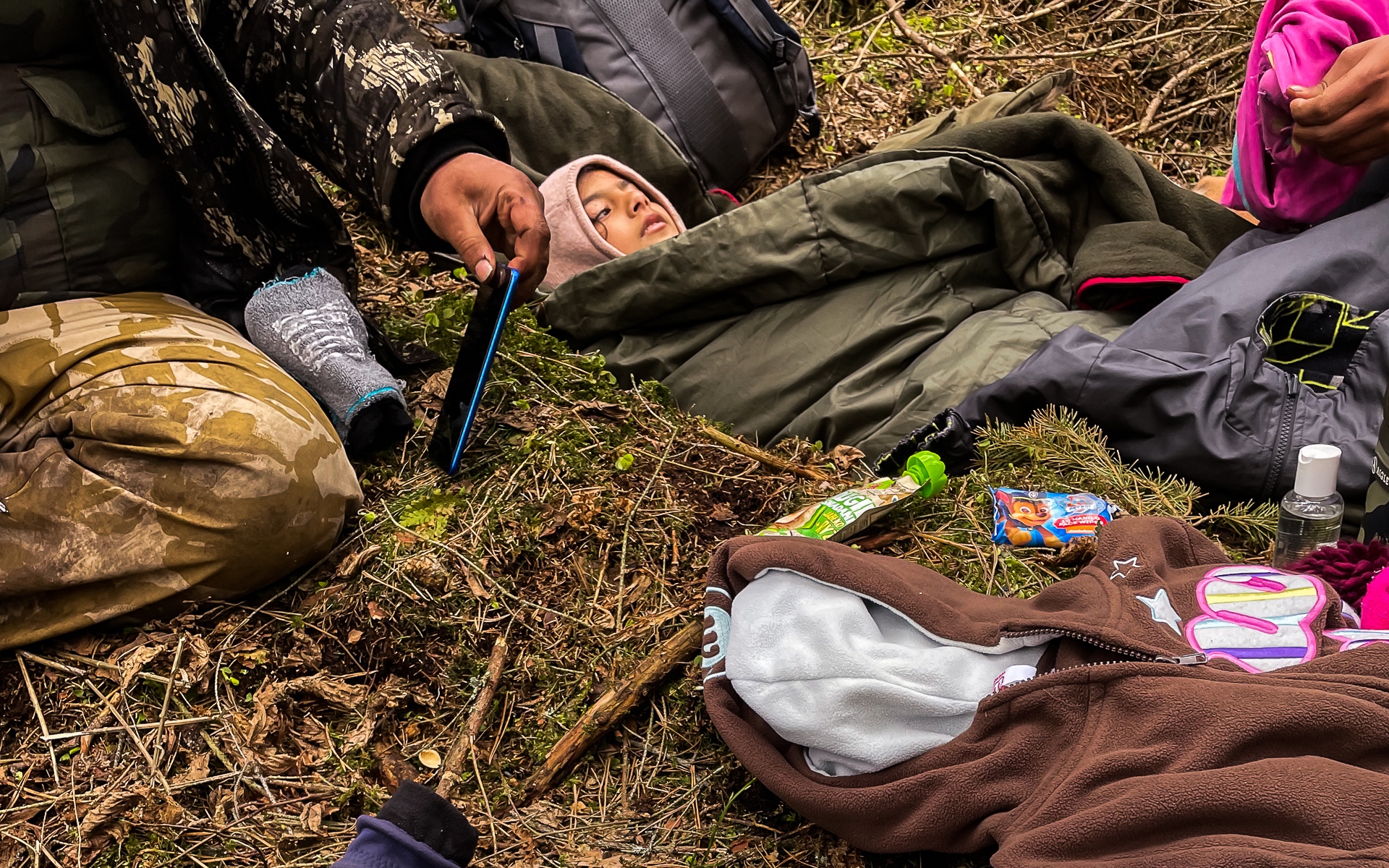
I was not prepared for the sight of a distraught father who carried his 9-year-old sick daughter through the forest in a baby carrier; through THIS forest, difficult to walk, dangerous and surprising terrain. Attracted by the "open" border to Europe, he wanted to reach a country where he could treat his sick child, because in his place of residence in Lebanon, despite working several jobs, the family could not afford it. Earlier, the family had fled from Palestine. Going on a journey to save Yara's life, they left Yara's mother and her 5-year-old brother behind in Lebanon. Five days in the harsh forest, with night frosts, did its job. Yara's condition deteriorated greatly. When I found them there was no contact with her. Her legs were swollen, frostbite. She was staring somewhere ahead. I felt terror, tenderness, and an adrenaline rush to fight for her life. The last months of the crisis have made me know who to call for help, I even know who speaks Arabic. I also knew that I would not allow them to be expelled to Belarus. I needed an interpreter and a doctor to decide what to do next. One phone call after another and a quick help action. The girl only started to react a little after drinking a cup of tea. She stared at me without any emotion. Even the stuffed dog keychain I wanted to cheer her up with didn't catch her attention. I had to leave them for a while to get a doctor and an interpreter. The father was very scared by this fact, I promised to come back with help as soon as possible.
Lucyna Marciniak (read interview), a doctor from the clinic in Białowieża, arrived at the place after work, and an Arabic language translator, who was on a volunteer duty at the border at the time. During the crisis, many people came on their "holidays" to help.
In the meantime, a group encountered on the way to Yara and her father also received help. It was not without emotions when the helicopter arrived, but the dense spruces gave us shelter. I slid under the branches so abruptly that I lost my phone on my way out. Found later with the support of a group of refugees I met.
The doctor, after examining the girl and translating the medical information, decided that there was only one decision. We take the child out of the forest on a stretcher because she needs professional help in the hospital. Her life and health are in danger. On a stretcher through the swamp, hollows, fallen trees. Only the next day I notice a lot of bruises on my legs, during the forest crossing I feel absolutely no pain. The ambulance will not reach the swamp, I am asking for help from my husband to drive an off-road car to us as close as possible. When we take Yara out of the forest, we call the ambulance and 112 to notify the Border Guards. On 112, because it's better not directly, anyway, I didn't have a number and there was no Internet coverage. We make an appointment in a specific place so that the ambulance does not have to wander. We are the first, we wait about 10-20 minutes, during which time I sign a power of attorney for both of them. We sign the papers brought by a friend. The girl lies motionless in the back seat of the car, and I hope she didn't hear the argument with the Border Guards and Soldiers. The police turn out to be more professional and balanced. A friend from the Border Guards pretends that we don't know each other, he treats us like criminals and a uniformed officer from the army wants to identify us without introducing himself. He says it is an order.
In the meantime, an ambulance arrives, the girl is transferred to her and the Border Guards ask if I am willing to bear the cost of the ambulance. I don't know what the reason was, because the summons was justified and confirmed by a doctor. Lucyna gives her medical background report to the ambulance crew and the ambulance with Yara and her father inside leaves. Listed by undercover policemen, we go our separate ways. The girl is safe as long as she is in the hospital in Hajnówka. There, Kasia Poskrobko, a Hospital Caseworking Coordinator (read inetrwiew) takes them under her wing, feeds them, dresses them, calms them down. She sends me a picture of Yara smiling, which makes her cry with joy, because she is a completely different baby than the one curled up in a wet sleeping bag with erratic eyes. How little it takes to bring back a child's smile. Care, a sense of security, a warm bed and a meal. The features and characteristics of a person change dramatically. This is a powerful metamorphosis.
The discharge card reads that she was admitted in an average condition, apathetic, lying down, ticks on the skin of the face, cold skin, icy hands and feet, blue fingers and toes, swollen dorsum of the feet, signs of dehydration. Frostbite of the fifth toes was treated pharmacologically. Due to dehydration, intravenous access was not possible; the surgeon established an intraosseous access within the left lower leg. Due to a genetic disease, on April 29, 2022, the child goes to Bialystok to the University Children's Clinical Hospital in the neurology department to wonderful doctors. They bring her back to life with drips, save her frostbitten fingers. They translate medical documents from the country of origin. Treatment of her basic disease is needed in another ward, but since it is May, renovations, neurology stays full.
Meanwhile, Yara's dad asks for an intervention when the Border Guards put officers in their room 24 hours a day. The head of the department asks if those guards can be placed at the exit from the ward, but there is no consent to this. Finally, the officers are placed in front of the door of the family room. I visit them in Bialystok twice, I talk to the doctor, we agree that after the weekend there will be consultations with an immunologist. I play with Yara and when I pretend to slurp the tea she laughs like never before. I run to bring them the KFC they dream of. I am flooded with joy. In the meantime, we're getting a lawyer. I met him outside the hospital, my feet were chafed to the blood as I put on shoes without socks in a hurry. It was hot, I was sweating like a rat, and I was exhausted. But what the heck, everything happened according to the best scenario.
The Border Guards invites us to the departmental conference room for an interview. The machinery of granting them international protection will start. I feel a great responsibility not to be late with something, not to miss something. People's fates are at stake. There is a lawyer and that keeps me upright. I have never had the power of attorney for anyone and I have no idea about many matters related to this, although during conversations with the Border Guards I pretend to be a very experienced person who knows the regulations and procedures.
On the day of discharge, May 4, 2022, the Border Guards inform that they will take them to their facility for administration activities and then we are to take them to the reception center, which luckily means that they will not go to Belarus or to a closed center. Yara's father and I exchange thumbs up because that's how we communicate without an interpreter. I can't drive them to the center myself, so I'm asking my friends. The activities take many hours, fingerprints, and finally, another examination confirming the state of health at the Ministry of Interior and Administration Hospital. Their friends drive them to the Reception Center, doing grocery shopping on the way, so that they don't miss anything for the next few days. We make an appointment to contact them when they will be directed to Bialystok, there we have a preliminary appointment to continue the treatment of the girl as soon as she receives the PESEL (polish identity number), because it is a pass to expensive treatment.
When collecting Yara's discharge, there is a problem, because she needs a polish identity number to get the discharge, however only entering the asylum procedure allows you to apply for it and this takes time.
A Syrian boy
(20 years old)
On a chilly March afternoon, two men—one from a nearby village and the other from a tourist destination—went to see the wall up close. Upon returning, they stumbled upon a 20-year-old Syrian man lying on the road, just 300 meters from the border dam. He appeared resigned and was shivering from the cold. He was soaked and freezing. The two men called me for assistance, providing the young boy meanwhile with food and warm tea. They also concealed him from the road, recognizing that leaving him exposed would be a death sentence, given the increasing number of fatalities at the border. The fear of refugee pushbacks has driven many to provide humanitarian aid in secrecy. Unfortunately, the men were not equipped to assess the Syrian's health, nor could they communicate effectively due to the language barrier. It was necessary to conduct an initial assessment of the situation and determine whether medical attention was required.
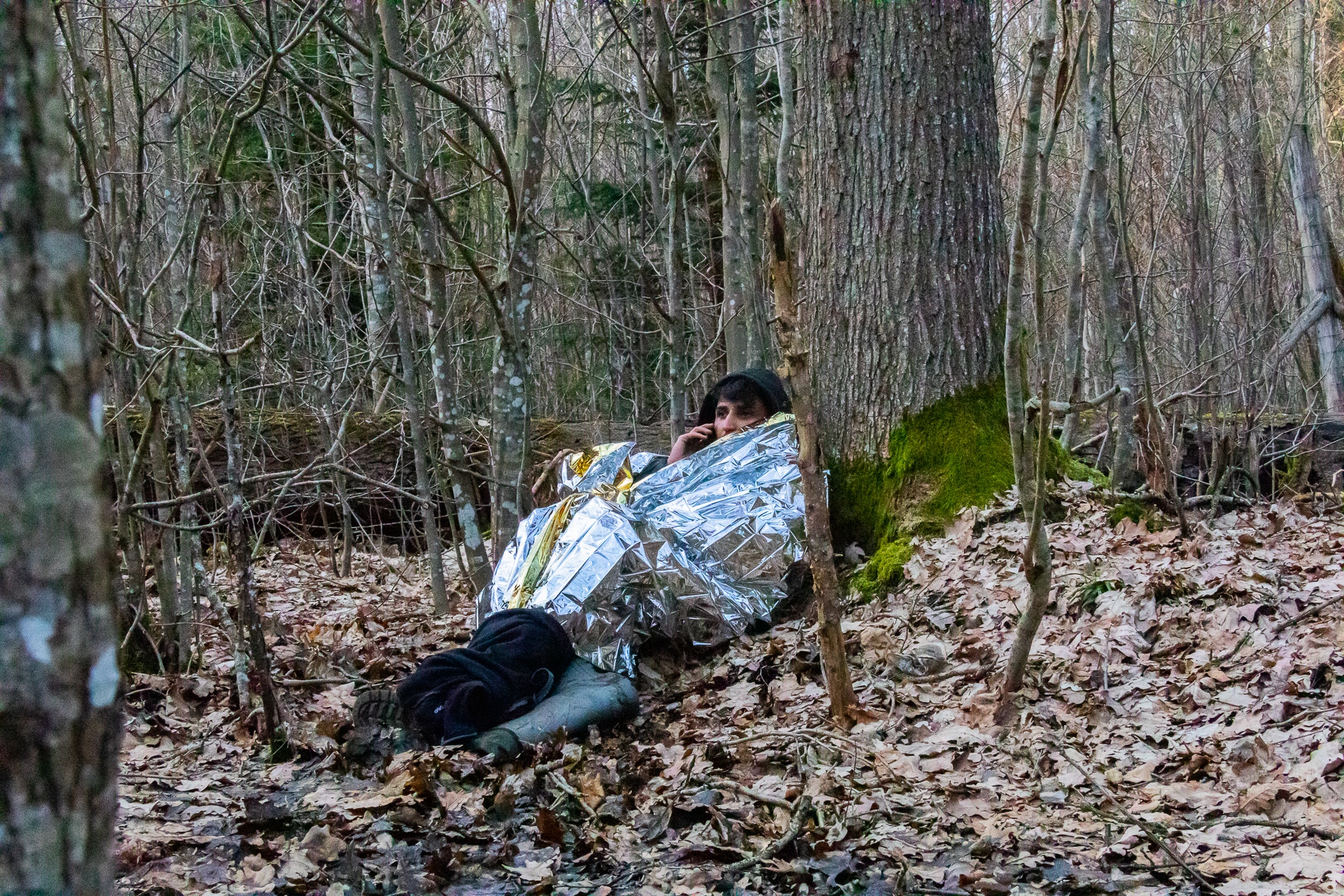
I arrived at the scene in under an hour and immediately connected with an Arabic translator to communicate with the young Syrian and assess his situation. He explained that he had fallen into a swamp. Wearing wet clothes and rubber boots without socks, he couldn't keep up with his companions, who had left him alone. With no cellular coverage or internet access, he didn't know how to seek help. As time passed, he grew colder and colder. He was sure that he would die in the forest, so seeing the road and having no strength for anything else, he lay down on its shore where he was found. Wrapped in a thermal blanket with heaters, he slowly recovered, drank heavily, but refused to eat due to a sore throat. He was given a cold and painkillers. Tired of the road and a few days' stay in the forest, he needed time to recover, gain strength and continue on the road he had planned. We managed to find a place where he could stay within range and contact his brother. I will never forget the change in his resigned, tired and gray face when he heard his brother's voice on the phone, his eyes sparkled and a wide smile completely changed his appearance. It was a very touching moment.
Shy and scared at first, he did not want to talk to me, but he gained courage when he saw that we wanted the best for him. I wrote him on the translator that I would like to know his story and asked him a few questions. I recorded his answers on a voice recorder so that I could later ask my Arabic-speaking friends for a translation. They are very short and concise, as if he was afraid of hurting himself and letting me hear the answers.
Dressed, fed and healed, he set off on his further journey. I also had to prepare him in case he was expelled to Belarus, he was devastated when I explained to him that his journey could end differently. For example, in Belarus. He got food, a thermo blanket, heaters, a power bank and a supply of water. It took me a long time to get any information about his fate. I have word that he has reached his family and is safe.
I returned to the place where I met him after a few days to clean up what was left. What was left were wet wellingtons with holes, a water bottle and used heaters. Silent witnesses of saved lives.
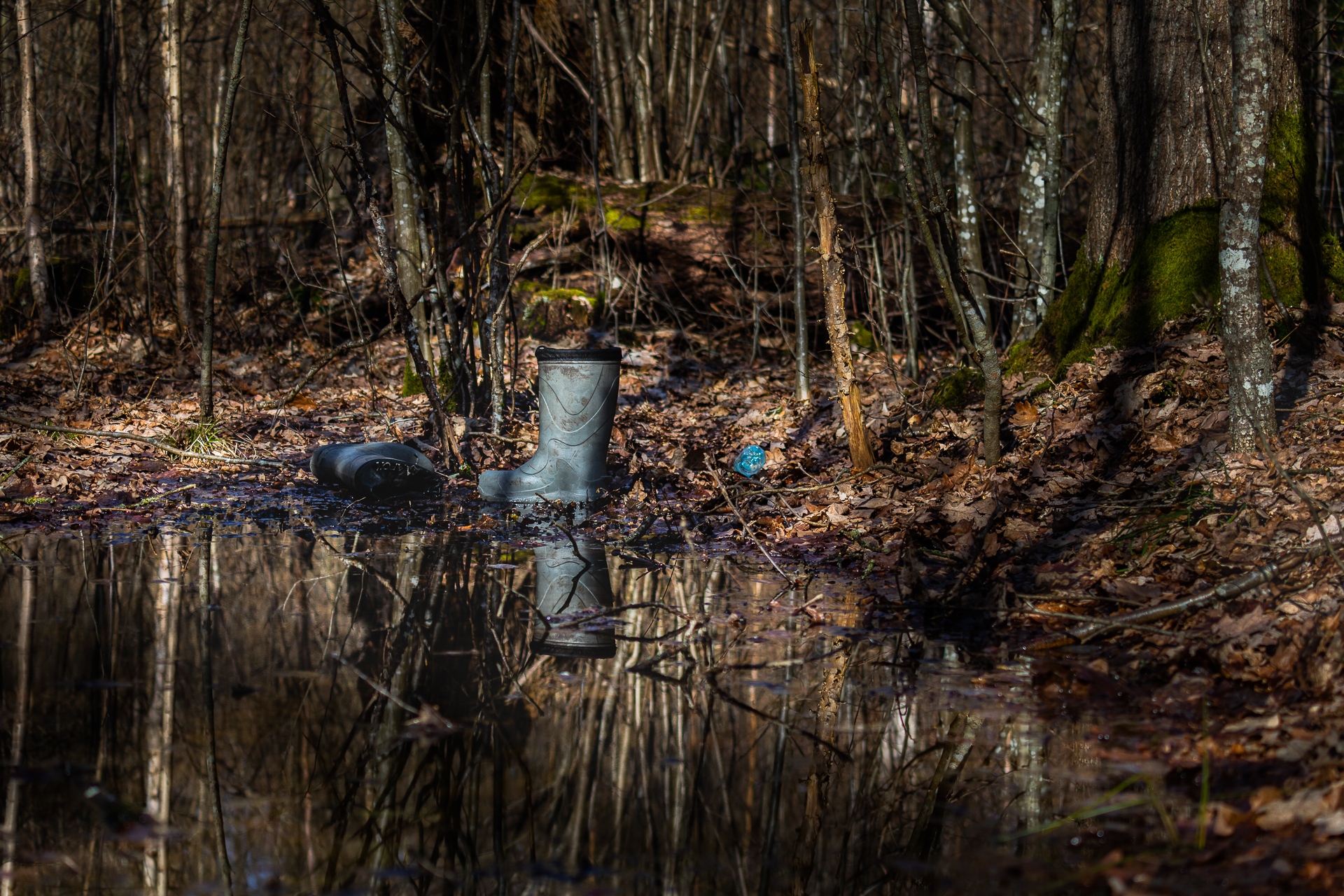
Below are the questions I asked him in Polish and Arabic, a recording of his answers and a translation into Polish.
E.K.: Tell me your story and I will record your voice. You don't have to give your last or first name. I would like to know when did you start your trip? Why are you fleeing Syria? Where did you fly by plane? How did you get over the fence at the border? How many days were you in Belarus and how many here in Poland? Have you been expelled to Belarus from Poland before? How were you treated at the border? Where are your comrades now? Have they succeeded? What do you want to do in life?
أخبرني قصتك وسأسجل صوتك. ليس عليك إدخال اسمك الأخير واسمك الأول. أود أن أعرف متى ذهبت في رحلتك. لماذا تهرب من سوريا؟ أين سافرت بالطائرة؟ كيف تجاوزت السياج على الحدود. كم يوما كنت في بيلاروسيا وكم كنت هنا في بولندا. هل سبق لك أن طردت من بولندا إلى بيلاروسيا. كيف عوملت على الحدود؟ أين رفاقك الآن. هل نجحوا؟ ماذا تريد ان تفعل في الحياة.
Recording transcript:
“From Syria to Lebanon, from Lebanon to Dubai airport, then to Russia airport. When I got to Russia, my brother talked to the smuggler who transported me to Belarus. I spent about a week in Belarus, after which I ended up in the forests. We cut the fence (sistiema) on the side of Belarus. We entered there, there was no danger, and we sat in the forest for 3 days. On the third day I managed to cross the Polish wall. I stayed there 2 and a half days after I crossed the Polish wall. Then you came and helped me.I moved from Syria because of finances and material situation and because I wanted to avoid the army. In Syria, the army recruits for 10 years, I left to earn money and secure my future. And then when I come back, I'll pay a fine for 10 years of military service, as you know, it's hard for us with finances.As for my friends, I don't know what happened to them. Whether they were caught or thrown out. It was the first attempt and there were no pushbacks. I would like to go to Germany to earn money and help my family. My mom needs surgery."